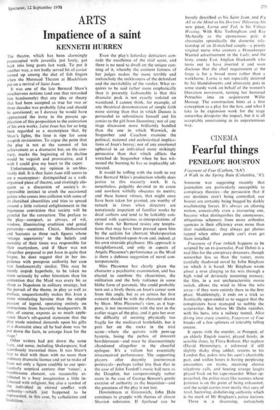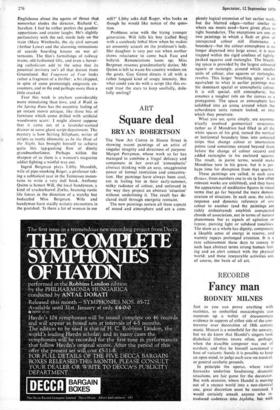CINEMA
Fearful things
PENELOPE HOUSTON
Fragment of Fear (Carlton, 'AA') A Walk in the Spring Rain (Columbia, 'A').
Someone was suggesting recently that journalists are particularly susceptible to conspiracy theories—the persuasion that if our destinies aren't being controlled, our houses are certainly being bugged by darkly machinating forces. It's always an alluring notion, conceivably even a reassuring one, because what distinguishes the anonymous, ubiquitous schemers from more orthodox agencies is their efficiency even more than their maleficence : they always get phones tapped when other people can't even get them installed.
Fragment of Fear (which happens to be scripted by an ex-journalist, Paul Dehn) is a real film for the conspiracy dreamers, though somewhat less so than the tauter, more carefully shadowed novel by John Bingham on which it is based. Mr Bingham wrote about a min clinging to his wits through a high wind of deviously mounting menace; the film, in a not uncharacteristic movie switch, allows the wind to blow the wits away—if they were entirely there in the first place. Maddeningly, it ends on a trick so frantically open-ended as to suggest that the conspirators have managed to nobble the scriptwriter. But before Mr Dehn vanishes, with his hero, into a railway tunnel, Alice diving into crazy country, Fragment of Fear breaks off a few splinters of tolerably telling unease.
It opens with the murder, at Pompeii, of an elderly Engish tourist, played firmly, in sensible shoes, by Flora Robson. Her nephew (David Hemmings), a reformed if still slightly shaky drug addict, returns to his London flat, pokes into his aunt's charitable past, and within hours is having perplexing encounters on trains, receiving elusive telephone calls, and hearing strange laughs played back on his tape-recorder. When ap- proached, the police react like nannies whose patience is on the point of being exhausted; and the script carries over neatly that aura of tired, hectoring, disbelieving authority which is the mark of Mr Bingham's police stations.
There is a disarming, melancholy
Englishness about the agents of threat that somewhat eludes the director, Richard C. Sarafian. I feel he rather prefers the gaudier apparitions and crazier laughs. He's slightly perfunctory with the sad, suede lady on the train (Mary Wimbush), the sly civil servant (Arthur Lowe) and the alarming intimations of seaside boarding houses on wet af- ternoons. The film's furnishings of railway trains, old-fashioned lifts, and even a hover- ing catholicism add to the sense that its potential territory isn't all that distant from Greeneland. But Fragment of Fear looks rather a fragment of a thriller : a bit chipped, in spite of some promisingly enigmatic en- counters, and in the end perhaps more than a little cracked.
Fear this week is anyhow considerably more stimulating than love, and A Walk in the Spring Rain has the eccentric feeling of an instant movie antique, like those bits of furniture which come drilled with artificial woodworm scars : I might almost suppose that it came out of a lavender-scented drawer in some ghost script department. The mystery is how Stirling Silliphant, writer of scripts as tautly idiomatic as In the Heat of the Night, has brought himself to achieve quite this tap-gushing flow of dimity grandmotherliness. Perhaps within the sharpest of us there is a woman's magazine addict fighting a wistful way out.
Ingrid Bergman plays Libby Meredith, wife of pipe-smoking Roger, a professor tak- ing a sabbatical year in the Tennessee moun- tains to write a very dull book. Anthony Quinn is honest Will, the local handyman, a kind of crackerbarrel Zorba, beaming rustic life forces in the direction of a starchy but bedazzled Miss Bergman. Wife and handyman have staidly ecstatic encounters in the goatshed. `Is there a lot of woman in me still?' Libby asks dull Roger, who looks as though he would like notice of the ques- tion.
Problems arise with the trying younger generation. Will fells his boy (called Box), with a carelessly lethal blow when he makes an unseemly assault on the professor's lady. Her daughter is very put out when mother shows reluctance to come back East and babysit. Renunciations loom up; Miss Bergman resumes grandmotherly duties; Mr Quinn is left to waste his country wisdom on the goats. Guy Green directs it all with a rather languid kind of soupy intensity. But what could you do with a script like this ex- cept trust the stars to keep soulfully, dole- fully smiling?















































 Previous page
Previous page